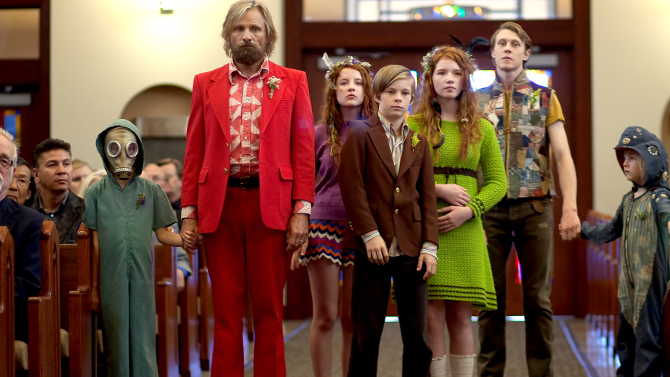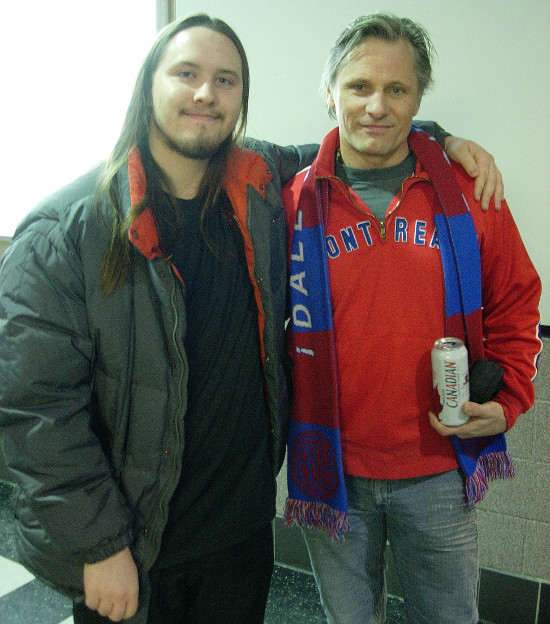I have always been a big proponent of the education system teaching philosophy. When translated from its original Greek root words, we learn that it is best described as the love (philo) of wisdom (sophia), which is very much at the heart of the 2016 film Captain Fantastic – written and directed by Matt Ross.
Towards the end of the motion picture, our main character, a multi-faceted father named Ben (Viggo Mortensen), is read a letter from his now deceased wife (her mother thinks he needs to hear it). At one point, she references the term ‘philosopher king’ – a concept adopted by Plato. For those of you who do not know of it, it was these people that he emphasized would rule his perfect utopia. Dedicated to the pursuit of knowledge and living a simple life, their ways were not that of bells and whistles (like most rulers, who live in extravagance and are catered to), but rather, to refrain from such things, educating themselves in the ways of wisdom and understanding the higher forms of knowledge.
I spend so much time on this concept as it is very much the setting that Ben raises his six children in. With some semblance of a magical world much like Neverland, their off-the-grid life in the North Western wilderness of the United States is unlike anything most city dwellers have ever seen. Their home is simple, yet effective, and their ways are centred around the pursuit of knowledge and keeping their bodies in peek physical form. Though home schooled, their father’s frank discussions and challenging reading material (Jared Diamond’s Guns, Germs, and Steel; Vladimir Nabokov’s Lolita . . .) truly tests their bounds, pushing them much farther ahead than kids of a similar age. They must refrain from using words like ‘interesting’, as it is seen as a weak word that does not provide any critique of the subject matter. They are versed in many languages and can hunt, defend themselves and rock climb. Though in many ways severe, it cannot be argued that this way of life does not work.
Viggo Mortensen’s Ben is a loving father who truly cares for his children, though is a rigid taskmaster who drives them at breakneck speed (they are often bloody and bruised). Disillusioned with the gluttony, greed and the excesses of corporate America, the couple chose to raise the children in this secluded locale. And though Mortensen is the script’s main driving force (nominated for an Academy Award for Best Actor), each of the children are well rounded and superlative in their roles. They all have well defined personas, from eldest Bo (George MacKay), who is hiding the secret that he has gone behind his father’s back, and with his mother’s help, applied to and has been accepted at every iconic University in the United States, to younger brother Rellian (Nicholas Hamilton), who blames his dad for his mom’s death. There is a reality and spirituality that guides these talented youngins, who are able to deliver complicated dialogue and act in more than difficult scenarios, convincing us of its realism. Samantha Isler, Annalise Basso, Shree Crooks, and Charlie Shotwell are the other four gifted young actors that round out the more than realistic family.
The film’s main journey or nexus comes from the death of Ben’s wife and the children’s mother, as they are then forced to travel outside of their utopia to where she was being treated – across much of an America they have never seen. It is an eye opening experience, as they are unused to processed food, violent video games (a memorable scene) and obese individuals. Though versed in writings new and old, in history and politics, they are inexperienced in communicating with others, blending in or putting up masks to protect themselves from unwanted pain. Their concepts of love and communication are skewed (a perfect example being when Bo meets a girl at a trailer park), their dress code unseemly, and their one and only perspective leaving them crippled in a world that revolves so much around technology and subterfuge (Ben never lies to his children – believing that they are always mature enough to be taught something new and accept the truth).
At odds with his wife’s father Jack (a nice surprise when Frank Langella appears), who is no villain, just a caring family member who wholeheartedly disagrees with Ben’s vision – a man who gets his way in a morally questionable fashion. He lives on a golf course, enjoying a life of luxury. He is very much the antithesis of their whole existence – connections to politicians and officials, he exemplifies their perspective that revolves around money and corruption. He envisions a life in which the children are raised in ‘normal’ schools and live ‘normal’ lives – though his idea of ‘normal’ is Ivy League schools, posh restaurants and all the trappings of the modern elite.
It is this confrontation with 21st century civilization (things do not exactly go smoothly, each and every step bringing a new, unorthodox hurtle) that leaves Ben in a state of anxiety. He is desperate to honour his wife’s last wishes; in contrast, her conservative, traditionalist father does not care about her last will and testament – doing it his way. Eventually he is left with a difficult decision as they journey deeper down the rabbit hole. Is it fair to cloister his children away, raising them the way he sees fit? Do they deserve a chance at enjoying the finer things in life? Does he even have a choice in the matter?
To once again return to philosophy for a moment, as the film progresses it can be argued that we transition away from the words of Plato and into those of his successor, Aristotle. Describing the concept of the Golden Mean, it is finding the middle path between two extremes. Easier said than done, in many ways contrary to the rigidity in which many people think, it can be seen that Ben is at one end of the spectrum, while Jack is at the other. Though having honed their brains and bodies along the lines of Plato’s vision, can one rule if they know nothing of the outside world and its people? Likewise, without knowing both love and hate, we cannot truly appreciate the other, and it is detrimental to our growth as human beings.
Most definitely a movie that will leave its audience talking long after the final credits have rolled, Captain Fantastic proves to be a fantastic family drama that mixes smart philosophical topics with comedy, poignancy and heart. It is an important viewing experience in this day and age, as it very much highlights our excessive ways – essays could be written when comparing the six children to their newly met modern cousins; the dynamics of their parents would also fit nicely (the couple are played by Steve Zahn and Kathryn Hahn). So, don’t flush this one down the toilet, it is a journey well worth taking; though perhaps I should just humourously end by paraphrasing the paradoxical perspective of the wisest man in Greece – Socrates, who perceived: all I know is that I know nothing.


